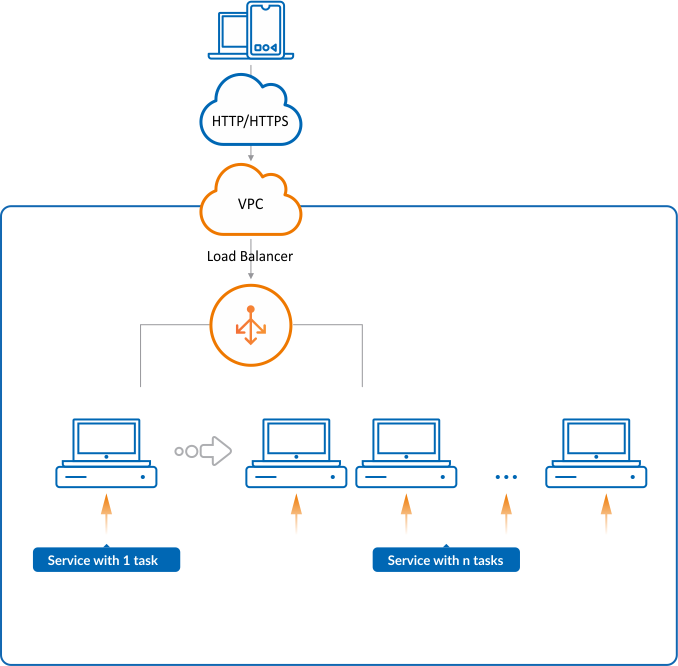Cloud Service
Deyel Cloud allows to develop, test, deploy, and execute web and mobile applications without worrying about the operational aspects of the platform technology. Modeled applications and their data are hosted directly on the cloud infrastructure provided by Deyel Cloud.

The Deyel Cloud infrastructure uses Amazon Web Services (AWS), incorporating the latest technologies and techniques into its platform to offer a reliable, secure and high-performance cloud service.
Each client accesses each of their environments in isolation. Depending on the contracted license, the development, testing, quality and production environments can be accessed.
Features of Deyel Cloud
A set of features make Deyel Cloud’s infrastructure robust and secure.
Execution Portal
Each environment has an execution portal where users can access to model and execute their applications.
Traffic is managed by the AWS Route 53 DNS service and AWS ALB (Traffic manager), which resolves and routes the URL to the environment. Each environment is deployed as a dockerized application running on a cluster using the Elastic Container Service (ECS) service. This service accesses an Aurora Mysql database schema and a file repository in AWS S3.
Security
Infrastructure incorporates protection against DDoS attacks using AWS Shield. AWS Shield protects web applications from common web attacks that can impact availability, jeopardize security, or consume excessive resources. Incorporates the AWS Web Application Firewall (WAF). This protection is defined on the Load Balancer with a set of preconfigured rules managed by AWS WAF. AWS WAF includes controls such as protecting against OWASP (Open Web Application Security Project) top 10 security risks.
Scalability
Deyel Cloud implements a dockerized service for each environment that is executed in a cluster service with one or several tasks. The number of tasks is defined using automatic scaling, allocating more resources at times when the environment is most used.

To detect periods of high resource consumption, the CPU usage of the service is analyzed. If it exceeds the expected percentage, additional tasks for the service are automatically initiated. These new service tasks immediately increase the amount of resources, thus generating greater processing capacity. This ensures optimal response times during periods of increased demand. When the service detects less resource use, it automatically decreases the number of tasks. Increase or decrease in the number of service tasks is carried out transparently for the user.
To implement this scaling scheme, Target Tracking Scaling Policies from the AWS ECS service are used.
Types of Deployment
Deyel incorporates different types of deployment to connect with the services of each company. The deployment types define the service access mode based on security requirements.
Backups
Deyel incorporates daily backups of all information and files uploaded in the applications.
Data Encryption
All transactional data is hosted in an AWS RDS service Aurora database and encrypted at rest using the AES-256 algorithm. Data in transit is encrypted using TLS 1.2.
Users can only interact with data via https only through the Deyel Cloud portal web user interface, of the Deyel mobile application or through the Rest api. Users must have login credentials and the appropriate authorization to access the data.
Business Continuity
A Disaster Recovery Plan (DRP) is incorporated to ensure business continuity.




